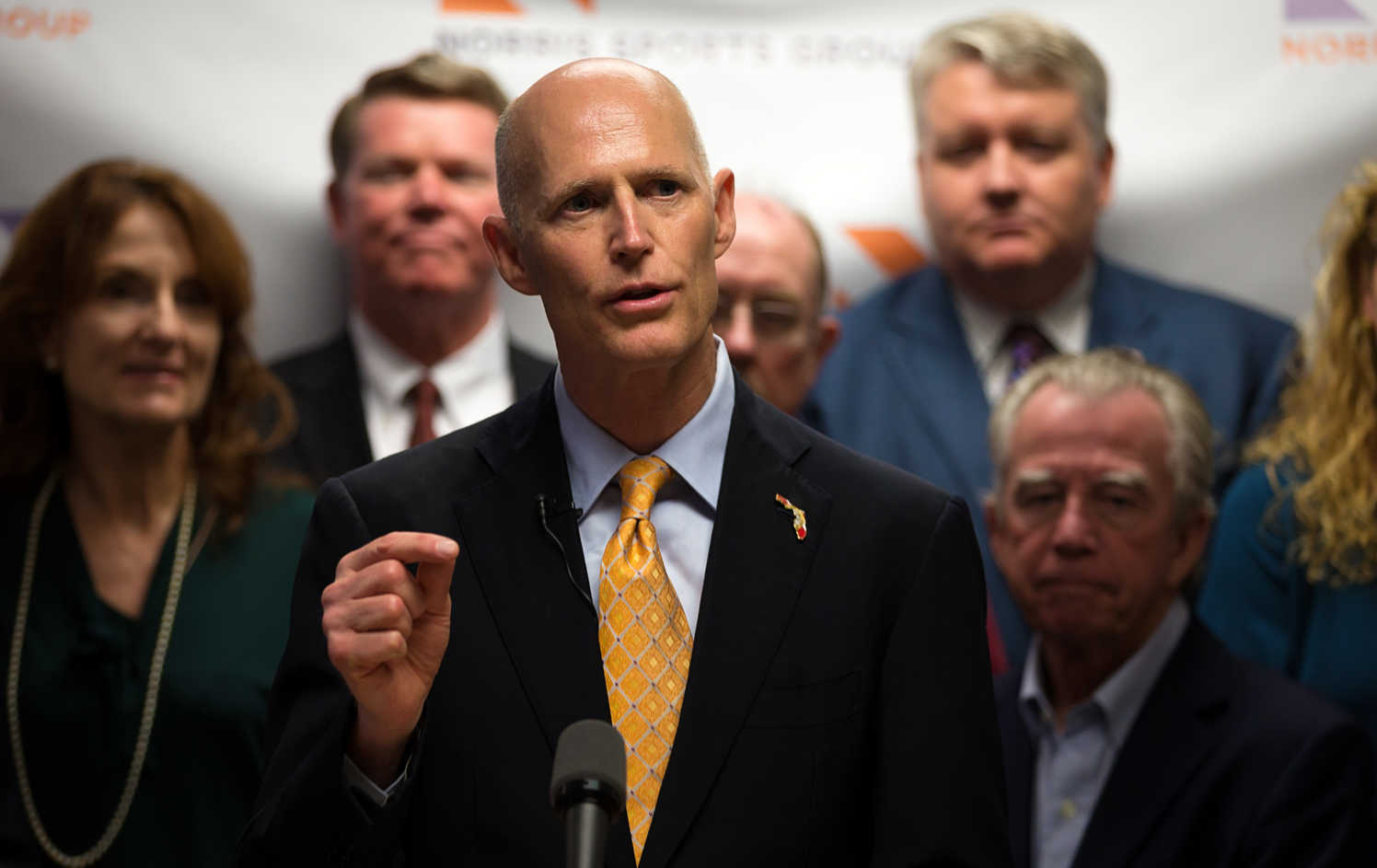
Gov. Rick Scott shifts again on Medicaid expansion
Has Gov. Rick Scott changed his mind on Medicaid again? In 2012, Scott said he was against expansion. In 2013 he said he was for it. Now, he says he’s against it. Or does he?
PolitiFact Florida decided to put Scott’s position on expanding Medicaid on our Flip-O-Meter, to document whether he has changed position. Let’s follow Scott’s pathover the past few years.
The starting point
Medicaid is the longstanding federal and state health insurance program for the very poor; traditionally people also have to be elderly, disabled, pregnant or a child to qualify. The Affordable Care Act, aka Obamacare, sought to expand that program to anyone making up to about 133 percent of the poverty level. (The original plan was that every state would expand the program, but a 2012 Supreme Court decision allowed each state to decide for itself.)
Before he ran for governor in 2010, Scott was a persistent critic of President Barack Obama’s federal health care law. In 2009, Scott spent $5 million of his own money to form Conservatives for Patients’ Rights and oppose the law.
For much of his first term, Scott said that Florida would not expand Medicaid, because it “just doesn’t make any sense” and that it was too costly.
We should note that Washington offers more generous cost-sharing for states that expand Medicaid. It covers 100 percent of the cost of newly eligible people through 2016, 95 percent in 2017, 94 percent in 2018, 93 percent in 2019, and 90 percent in 2020 and beyond. Those numbers are set by statute, so it would take new legislation from Congress to change those terms.
First flip
On Feb. 20, 2013, now sitting in the governor’s office, Scott announced a change of position, declaring unequivocally that he supported expanding Medicaid. He called it a “compassionate, common-sense step forward.”
While the federal government is committed to paying 100 percent of the cost of new people in Medicaid, I cannot, in good conscience, deny the uninsured access to care.
We will support a three-year expansion of our Medicaid program under the new health care law, as long as the federal government meets their commitment to pay 100 percent of the cost during this time.
Legislation we would support would sunset after three years and need to be reauthorized. It would also sunset if the federal government backed away from their 100 percent commitment during this period.
Scott’s announcement won headlines across the country. But the Florida Legislature had other ideas. It never approved the expansion.
We should note, however, that Scott never really pushed for the expansion. And he didn’t promote expansion during the 2014 campaign for governor against Charlie Crist, who said repeatedly he supported the federal law and would work for Medicaid expansion.
Back flip?
The Florida Legislature has been grappling with Medicaid expansion during its 2015 legislative session. The House of Representatives is opposed; while the Senate seems more open.
On April 6, Scott rattled the understanding of his position on Medicaid when he seemed to come out against expansion in comments he made about the state’s money troubles with a separate federal health care program called the Low-Income Pool.
The LIP, as it’s known, started in 2006. It’s a Medicaid pilot project that distributes $2.2 billion to hospitals to cover the cost of treating low-income, uninsured and underinsured patients. The federal government provides about half the money. The program was set to expire in 2014, but the federal Centers for Medicare and Medicaid Services (CMS) agreed to extend it until June 30, 2015.
A CMS spokesman told PolitiFact, “The one-year LIP extension has allowed the state to engage in a process of critical planning to address the need for a more sustainable Medicaid financing system.” The spokesman said CMS has no plans to extend the LIP program in its “current form.”
Scott viewed this a sign that Washington is an unreliable partner.
Here’s the full text of his statement: “Our priority is to cut more than $600 million in taxes this session and get K-12 education funding up to record levels while holding the line on college tuition. We still have several weeks left for budget negotiations; however, given that the federal government said they would not fund the federal LIP program to the level it is funded today, it would be hard to understand how the state could take on even more federal programs that CMS (the Centers for Medicare and Medicaid services) could scale back or walk away from.”
Many people took that to mean Scott had backed away from Medicaid expansion. The next day, reporters pressed Scott to clarify whether this meant he no longer supports expanding Medicaid. Scott declined to answer directly.
“I like the program we have right now,” Scott said.
We asked Scott’s office if he still wants expanded Medicaid. As of our deadline, we have not heard back.
Our ruling
In 2013, Scott said in no uncertain terms that “we will support an expansion of our Medicaid program under the new health care law.” In 2015, Scott suggested the state should not expand Medicaid, saying it would be “hard to understand how the state could take on even more federal programs.”
Scott’s change of position on expanding Medicaid is particularly perplexing because it comes at a time when the Florida Senate seems to be genuinely considering legislation to either expand the program or propose some kind of overhaul to the program. His April 6 statement dumps cold water on that effort.
That’s a dramatic about-face from supporting expansion. We rate this a Full Flop.
(From: PolitiFact Florida)

